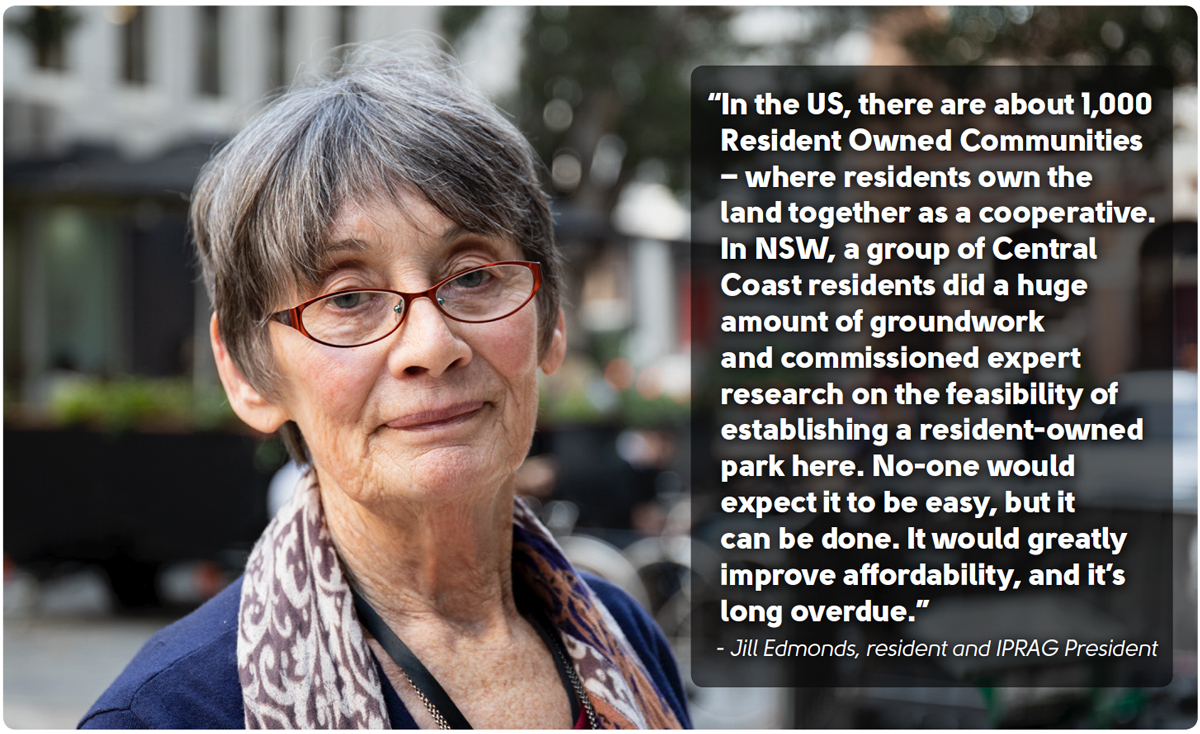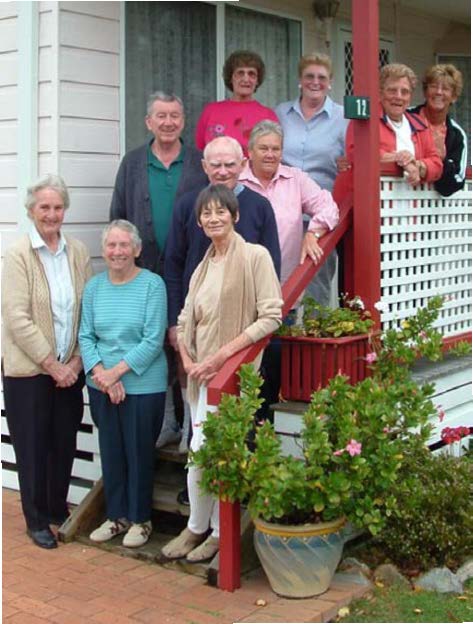Cooperative communities
07/08/2019
By Julie Lee (Tenants’ Union of NSW), with Jill Edmonds (resident and IPRAG President)

In New South Wales land lease community living appears to be flourishing. In recent years we have seen new communities being opened, others being expanded and an increase in the quality and availability of new homes. However, there is an undercurrent of discontent and some home owners believe the Residential (Land Lease) Communities Act 2013 has undermined the rights of home owners in favour of operators. At the heart of this discontent is the power imbalance between operators and home owners.
Land lease communities (previously called residential parks) have long been considered and marketed as affordable housing. In some respects this is still a valid description. The cost of purchasing a home is generally lower by comparison than the local real estate market and home owners in land lease communities don’t pay council rates. However, affordability is a concern to home owners and the biggest issue is the level of site fees and site fee increases. We recently heard about a community where site fees have reached $315 a week and others are heading that way. Home owners feel they have little say in site fee increases and that the system is weighted against them.
Advertising for land lease community living is commonly targeted at older people and many communities are marketed as over 50’s or over 55’s lifestyle villages. It is the lifestyle and the sense of community that is attractive but what some find out later is the lifestyle they thought they were buying into does not exist. In its place can be a community governed through fear and retaliation where home owners feel they have to give up their rights in return for a quiet life. Operators hold and wield a great deal of power in land lease communities and when that power is abused it affects the lives of all home owners within that community.
The crux of the problem with land lease communities is that home owners don’t own the land on which their home sits and the person or entity who does own the land holds significant power. So, what if that could change? What if home owners could become the owners of the land and manage their own communities?
The history of land lease communities in New South Wales is similar to that of the United States (US) where ‘mobile home parks’ are common and are considered an affordable housing option. Originally designed to be towed and used for holidays, mobile homes or caravans morphed into housing and eventually governments in both countries accepted and regulated this type of living. Over the years homes became less mobile and today manufactured homes are more the norm with older style homes being phased out as the owners move on.
Security of tenure has always been an issue in this type of living arrangement and in the 1990s New South Wales experienced a number of residential park closures resulting in the fracturing of communities and the displacement of residents. Home owners in mobile home parks in the US face the same issue but rather than simply moving on when a park is threatened with closure some home owners have formed cooperatives and bought their communities. Today approximately 1,000 communities in the US are resident-owned.
Cooperative communities in the US
In the US resident-owned communities are known as ‘Resident Owned Communities’ (ROCs). A ROC comes about when the residents form a cooperative and purchase the land (community). Each resident becomes a member of the cooperative and owns an equal share of the land. The cooperative manages the business that is the community and therefore has control over site fees, community rules, common property and community repairs and improvements. The day-to-day management is undertaken by an elected board of directors.
Residents in the US who want to purchase their community do not have to go it alone. Advice, support and finance is available through organisations like ROC USA®. ROC USA® is an amalgamation of nonprofit organisations that joined together in 2008 to assist making resident owned communities viable throughout the US. ROC USA® is assisted by grants from several foundations that enable it to provide loans to residents to purchase their community.
In New South Wales the sale or redevelopment of communities appears less of a threat today but affordability is a live issue. Could affordability be the catalyst for a move to resident owned communities in New South Wales and is that even possible?
Jill Edmonds, a home owner here in New South Wales, and president of IPRAG (Independent Park Residents Action Group), has conducted extensive research on ROCs and this is what she told us.
In 1984 the dilapidated Meredith Trailer Park in New Hampshire became the first resident owned non-profit land lease community in America. By the year 2000 “The Meredith Centre Cooperative” had refurbished its park and developed additional sites, debts had been fully repaid and the park had the lowest site fees in the state.
ROC USA® uses a non-profit, limited equity model, which keeps membership shares low cost and preserves affordability. Being equal owners of the entire property all members (households) repay an equal share of the purchase price through a percentage of their site fees. Any surplus each year is retained for the benefit of the community as decided by vote of the members who also decide appropriate site fees. Residents own their homes which can be sold at market value.
Opportunities for conversion to resident ownership arise when a park is available for sale and its low to middle income residents face eviction for redevelopment or extreme increases in site fees. A land trust ensures that if the members ever vote to sell their park proceeds go to supporting the ROC USA® enterprise.
A NSW case study
While the problems of redevelopment continue in America, large scale redevelopments have abated in Australia. However, back in 2002 a group of 200 Central Coast residents were confronted by a development application (DA) proposing construction of home units on two adjacent parks. At that time residents had zero protections in this situation and park owners had the right to terminate all site and tenancy agreements.

While fighting the DA residents formed Karalta Road Park Home Owners Incorporated. As such, they were successful in obtaining government grants to engage a consultant to research the feasibility of establishing a resident owned cooperative park similar to ROC USA®’s successful model.
The 70 page report, “Feasibility of Home Park Cooperative Ownership”, was completed in 2006. It included assessment of three options for securing affordable housing into the future. The residents realised their best option was to try for assistance to develop a new park to which their homes might be relocated. Also included was a spreadsheet for calculation of the financial viability of hypothetical parks of different sizes.
The report acknowledged some unhelpful realities. Being mostly pensioners, the residents realised they had no hope of raising a deposit for the massive loan that would be needed to purchase the land. Unlike the US, Canada, the Netherlands, Sweden etc, Australia has no cultural history of park resident owned cooperative housing. Also, Australia lacks America’s philanthropic culture that is key to the success of ROC USA®’s non-profit parks.
Nevertheless, the possibilities of something to help ease the State’s affordable housing crisis, at no cost to government, prompted a response from Government’s Centre for Affordable Housing (CAH). The CAH offered to bring relevant organisations together with the residents committee to find a way forward.
Jill, who was a participant in this project, explains, as well as the CAH (who labelled the enterprise, the “Pilot Project”), our months of meetings included our consultant who had written the report and, variously, two Community Housing Providers, the Association to Resource Co-operative Housing, Foresters ANA (then) Mutual Society and a Federal MP with a personal interest in low cost housing.
Meanwhile Karalta Road Park Home Owners Inc was searching for land and had found acreage owned by Gosford Council. The zoning was wrong but Council withdrew it from sale while negotiations continued. The resident committee also met with Clayton Utz Lawyers who agreed to take on the committee as pro-bono clients should the project proceed.
One of the Community Housing Providers committed to the project. However, when their proposal arrived a crucial agreed-upon condition had been changed. In return for their expertise and ability to access funding they required perpetual ownership of the land.
Our operator’s DA had long ago been refused and the residents were not desperate enough to swap one unpredictable park owner for another.
The other Community Housing Provider stepped into the gap, approved the model with minor concessions, but were unable to proceed for up to two years.
Much groundwork has been done and the opportunity is obvious. Jill believes reasonable site fees are more than enough to properly operate a park. Site fees provide a guaranteed cash flow and cash flows can be financed. Homes can be bought directly from manufacturers and installed for much less than the amount charged by operators. (Australian Financial Review, Humble home, smart profit, 7-8 September 2013). And if a co-op park’s elected board members don’t wish to handle day-to-day matters, they can employ a manager, just as investor-owners do. The same resources are available. Rent assistance would still be available to residents who currently qualify. In fact with lower purchase prices even more people may become eligible to receive rent assistance, increasing the viability of the community.
For a copy of the Feasibility report for this project (the financial calculations would require updating) contact Jill via IPRAG. Other recommended reading is a report into how ROCS form in the USA by Damian Sammon in 2011. The report is available to download here.
Jill concludes ‘No-one would expect it to be easy, but this can be done and it’s long overdue’.
